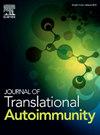Autoantibodies as prognostic markers in rheumatoid arthritis
IF 3.6
Q2 IMMUNOLOGY
引用次数: 0
Abstract
Background and purpose
Rheumatoid arthritis (RA) is a chronic inflammatory disorder characterized by progressively destructive polyarthritis. Key autoimmune features include the presence of autoantibodies. The purpose of this review is to discuss the diagnostic and prognostic properties of rheumatoid factor (RF) and anti-citrullinated protein/peptide antibodies (ACPA), based on current use in Sweden. Furthermore, we discuss their relation to disease outcomes and their importance for management of patients with RA.
Principal findings
Based on current cut-offs, ACPA has a higher specificity for RA than RF, and testing for ACPA alone is recommended when investigating patients with clinically suspect RA. The diagnostic utility of RF may improve with adjusted reference range/upper limit of normal.
RF and ACPA both predict rapid radiographic progression, severe extra-articular manifestations and mortality, whereas other outcomes, such as osteoporosis, pain and disability are not as clearly related to seropositivity. RF/ACPA positive patients respond better to some targeted therapies, in particular rituximab, compared to seronegative RA patients. Recent studies indicate that treatment of ACPA-positive arthralgia with abatacept may delay and perhaps sometimes even prevent development of arthritis. Available evidence does not support an added value of repeated RF or ACPA testing.
Conclusions
Testing for ACPA in patients with arthralgia or suspected early RA, and for ACPA and RF at RA diagnosis, provides useful diagnostic and prognostic information, which has implications for follow-up and treatment. Repeated testing for ACPA and RF is not recommended. Potential future developments include treatment of ACPA-positive individuals for prevention of arthritis.
自身抗体作为类风湿关节炎的预后标志物
背景和目的类风湿性关节炎(RA)是一种以进行性破坏性多关节炎为特征的慢性炎症性疾病。主要的自身免疫特征包括自身抗体的存在。本综述的目的是讨论基于瑞典目前使用的类风湿因子(RF)和抗瓜氨酸化蛋白/肽抗体(ACPA)的诊断和预后特性。此外,我们讨论了它们与疾病结局的关系以及它们对RA患者管理的重要性。主要发现:基于目前的截止值,ACPA对RA的特异性高于RF,在调查临床疑似RA的患者时,建议单独检测ACPA。随着参考范围/正常值上限的调整,射频的诊断价值可能会提高。RF和ACPA都能预测快速的放射学进展、严重的关节外表现和死亡率,而其他结果,如骨质疏松、疼痛和残疾,与血清阳性没有明确的关系。与血清阴性RA患者相比,RF/ACPA阳性患者对某些靶向治疗的反应更好,特别是利妥昔单抗。最近的研究表明,用阿巴接受治疗acpa阳性关节痛可能会延迟,有时甚至可能预防关节炎的发展。现有证据不支持重复RF或ACPA检测的附加价值。结论在关节痛或疑似早期RA患者中检测ACPA,以及在RA诊断时检测ACPA和RF,可提供有用的诊断和预后信息,对随访和治疗具有指导意义。不建议重复检测ACPA和RF。潜在的未来发展包括治疗acpa阳性个体预防关节炎。
本文章由计算机程序翻译,如有差异,请以英文原文为准。
求助全文
约1分钟内获得全文
求助全文
来源期刊

Journal of Translational Autoimmunity
Medicine-Immunology and Allergy
CiteScore
7.80
自引率
2.60%
发文量
33
审稿时长
55 days
 求助内容:
求助内容: 应助结果提醒方式:
应助结果提醒方式:


